Hard Numbers: Imran Khan faces new sentence, Russia gets economic upgrade, Philippines and Vietnam join hands in South China Sea, Germany makes big Bitcoin seizure
10: Pakistan’s former Prime Minister Imran Khan and former Foreign Minister ShahMahmood Qureshi were sentenced Tuesday to 10 years in prison for leaking state secrets. While Khan is already serving a three-year term on corruption charges, this is Qureshi’s first conviction. The new ruling comes just a week before general elections on Feb. 8. Khan’s political party, Pakistan Tehreek-e-Insaf, called it “a sham case” and plans to challenge the decision in a higher court.
2.6: Is President Vladimir Putin’s military spending spree paying off? Russia’s GDP is expected to grow 2.6% in 2024, according to the International Monetary Fund, which is 1.5 percentage points higher than its October forecast. For 2025, the IMF sees GDP growth for Russia easing to just 1.1%.
2: Philippine President Ferdinand Marcos Jr. signed two memorandums of understanding with Vietnam on Tuesday to boost cooperation on maritime security in the South China Sea. Vietnam also agreed to a five-year trade deal to supply up to two million tons of white rice to Manila. China, which is less than thrilled by such agreements between its neighbors, launched military drills in the disputed waters earlier this month as the US and Philippines initiated their exercises in the region.
50,000: German authorities on Tuesday seized 50,000 Bitcoins worth nearly $2.17 billion in Saxony. While no charges have been filed yet, police suspect that two men who purchased the cryptocurrency did so with profits from a piracy website. Police are investigating unauthorized commercial exploitation of copyrighted works and money laundering.
